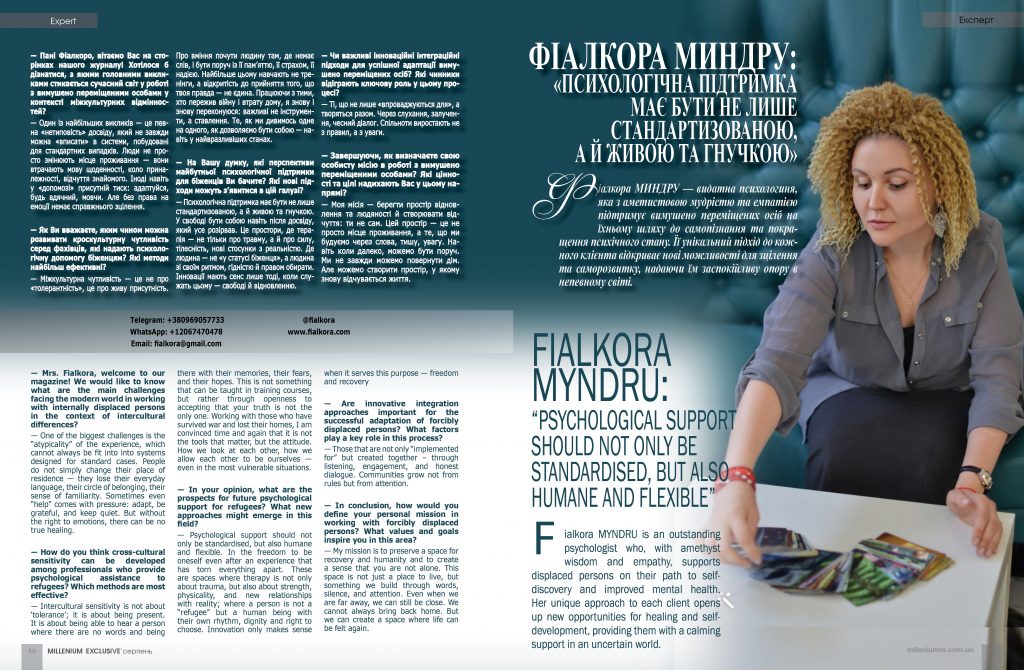Фіалкора МИНДРУ — видатна психологиня, яка з аметистовою мудрістю та емпатією підтримує вимушено переміщених осіб на їхньому шляху до самопізнання та покращення психічного стану. Її унікальний підхід до кожного клієнта відкриває нові можливості для зцілення та саморозвитку, надаючи їм заспокійливу опору в непевному світі.

— Пані Фіалкоро, вітаємо Вас на сторінках нашого журналу! Хотілося б дізнатися, з якими головними викликами стикається сучасний світ у роботі з вимушено переміщеними особами у контексті міжкультурних відмінностей?
— Один із найбільших викликів — це певна «нетиповість» досвіду, який не завжди можна «вписати» в системи, побудовані для стандартних випадків. Люди не просто змінюють місце проживання — вони втрачають мову щоденності, коло приналежності, відчуття знайомого. Іноді навіть у «допомозі» присутній тиск: адаптуйся, будь вдячний, мовчи. Але без права на емоції немає справжнього зцілення.
— Як Ви вважаєте, яким чином можна розвивати кроскультурну чутливість серед фахівців, які надають психологічну допомогу біженцям? Які методи найбільш ефективні?
— Міжкультурна чутливість — це не про «толерантність», це про живу присутність. Про вміння почути людину там, де немає слів, і бути поруч із її пам’яттю, її страхом, її надією. Найбільше цьому навчають не тренінги, а відкритість до прийняття того, що твоя правда — не єдина. Працюючи з тими, хто пережив війну і втрату дому, я знову і знову переконуюся: важливі не інструменти, а ставлення. Те, як ми дивимось одне на одного, як дозволяємо бути собою — навіть у найвразливіших станах.
— На Вашу думку, які перспективи майбутньої психологічної підтримки для біженців Ви бачите? Які нові підходи можуть з’явитися в цій галузі?
— Психологічна підтримка має бути не лише стандартизованою, а й живою та гнучкою. У свободі бути собою навіть після досвіду, який усе розірвав. Це простори, де терапія — не тільки про травму, а й про силу, тілесність, нові стосунки з реальністю. Де людина — не «у статусі біженця», а людина зі своїм ритмом, гідністю й правом обирати. Інновації мають сенс лише тоді, коли служать цьому — свободі й відновленню.
— Чи важливі інноваційні інтеграційні підходи для успішної адаптації вимушено переміщених осіб? Які чинники відіграють ключову роль у цьому процесі?
— Ті, що не лише «впроваджуються для», а творяться разом. Через слухання, залучення, чесний діалог. Спільноти виростають не з правил, а з уваги.
— Завершуючи, як визначаєте свою особисту місію в роботі з вимушено переміщеними особами? Які цінності та цілі надихають Вас у цьому напрямі?
— Моя місія — берегти простір відновлення та людяності й створювати відчуття: ти не сам. Цей простір — це не просто місце проживання, а те, що ми будуємо через слова, тишу, увагу. Навіть коли далеко, можемо бути поруч. Ми не завжди можемо повернути дім. Але можемо створити простір, у якому знову відчувається життя.
FIALKORA MYNDRU: “PSYCHOLOGICAL SUPPORT SHOULD NOT ONLY BE STANDARDISED, BUT ALSO HUMANE AND FLEXIBLE”
Fialkora MYNDRU is an outstanding psychologist who, with amethyst wisdom and empathy, supports displaced persons on their path to self-discovery and improved mental health. Her unique approach to each client opens up new opportunities for healing and self-development, providing them with a calming support in an uncertain world.
— Mrs. Fialkora, welcome to our magazine! We would like to know what are the main challenges facing the modern world in working with internally displaced persons in the context of intercultural differences?
— One of the biggest challenges is the “atypicality” of the experience, which cannot always be fit into into systems designed for standard cases. People do not simply change their place of residence — they lose their everyday language, their circle of belonging, their sense of familiarity. Sometimes even “help” comes with pressure: adapt, be grateful, and keep quiet. But without the right to emotions, there can be no true healing.
— How do you think cross-cultural sensitivity can be developed among professionals who provide psychological assistance to refugees? Which methods are most effective?
— Intercultural sensitivity is not about ‘tolerance’; it is about being present. It is about being able to hear a person where there are no words and being there with their memories, their fears, and their hopes. This is not something that can be taught in training courses, but rather through openness to accepting that your truth is not the only one. Working with those who have survived war and lost their homes, I am convinced time and again that it is not the tools that matter, but the attitude. How we look at each other, how we allow each other to be ourselves — even in the most vulnerable situations.
— In your opinion, what are the prospects for future psychological support for refugees? What new approaches might emerge in this field?
— Psychological support should not only be standardised, but also humane and flexible. In the freedom to be oneself even after an experience that has torn everything apart. These are spaces where therapy is not only about trauma, but also about strength, physicality, and new relationships with reality; where a person is not a “refugee” but a human being with their own rhythm, dignity and right to choose. Innovation only makes sense when it serves this purpose — freedom and recovery
— Are innovative integration approaches important for the successful adaptation of forcibly displaced persons? What factors play a key role in this process?
— Those that are not only “implemented for” but created together – through listening, engagement, and honest dialogue. Communities grow not from rules but from attention.
— In conclusion, how would you define your personal mission in working with forcibly displaced persons? What values and goals inspire you in this area?
— My mission is to preserve a space for recovery and humanity and to create a sense that you are not alone. This space is not just a place to live, but something we build through words, silence, and attention. Even when we are far away, we can still be close. We cannot always bring back home. But we can create a space where life can be felt again.
